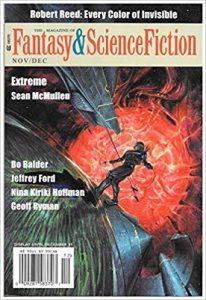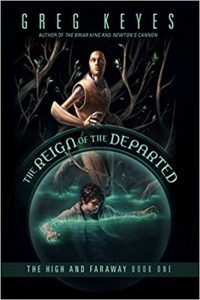Rich Horton Reviews Short Fiction: F&SF, Uncanny, Interzone, Galaxy’s Edge, and Bourbon Penn
 F&SF 11-12/18
F&SF 11-12/18
Uncanny 11-12/18
Interzone 9-10/18
Galaxy’s Edge 11/18
Bourbon Penn 11/18
Sean McMullen‘s “Extreme” from the November-December F&SF can be called SF horror, I suppose, though the horror is moral and arises from the social and economic extrapolation at the center of the story. Set in the relatively near future, the narrator is a man addicted to extreme experiences, due to genetics with the help of some enhancements. He finds himself hired for a mysterious project by a mysterious woman – whom he soon realizes is very rich and very old, thanks to life extension treatments. His first assignment – a hit – goes well, and he is chosen for more work. Then he realizes what that work really entails, which is very chilling.
Geoff Ryman‘s “This Constant Narrowing” is headed by a content warning, and manages to be legitimately challenging and legitimately discomfiting. The narrator, a Hispanic man from Southern California, is shot and then “rescued” by another man, and we realize that this is a world, reminiscent of Philip Wylie’s The Disappearance, in which all the women are gone, and some men shoot others to claim them for sexual services. We learn more about the narrator’s life, before the women disappeared, and his earlier friendship with a black cop. But things keep “narrowing” – the black men gone, and Asians, and so on…. There’s a message here, or perhaps there’s just a plea to think about the way we seem to be treating “others” – from all sides. Ryman is consistently able to provoke thought about subjects we sometimes avoid.
Other nice work comes from Bo Balder, with “The Island and Its Boy“, set on a sort of living island in an arctic-like sea, among a traditional-seeming society, in which a boy who can hear the island decides to stay with it when it leaves the cold seas behind, while the rest of his people, as tradition has it, colonize a new island – so, really original, with well-drawn characters and a believable society. There’s also J.R. Dawson‘s “When We Flew Together Through the Ice“, a harrowing story of a girl and her sister, who are taken by their mom from a farm on a colony world to be space nomads. The narrator has a C9 brain modification which makes her paranoid. Much of the story is about how that affects her self-image, how much her troubled mom affects that, and the terrible way this messes with their family and her sister.
In Uncanny’s year-end issue I liked “The Rose MacGregor Drinking and Admiration Society” by T. Kingfisher, which tells of the seduction of Rose MacGregor by a series of creatures of Faerie – an elf, a selkie, a pooka – and their mutual disappointment as she enjoys their company but fails to pine when they desert her – indeed, she marries a blacksmith. Wise and funny work. Isabel Yap’s “How to Swallow the Moon” is set in a village in which every so often a monster threatens to swallow the Moon unless he gets a pure girl to marry (or eat). It’s told by the girl who has been the companion of the current chosen virgin, who is set to choose among a variety of rich suitors – among whom inevitably is the monster. The conclusion is a bit on the obvious side, but the story is nicely told and originally decorated. Naomi Kritzer‘s “The Thing About Ghost Stories” tells affectingly of a woman, a folklorist who is an expert on ghost stories, and her relationship with her mother, who has Alzheimer’s. It takes place both before and after her mother’s death.
Interzone for September-October has a strong story by Samantha Murray, “Singles’ Day“, set in an overpopulated future where on Singles’ Day single people get remarkable discounts and the like – as part of a plan to encourage people to stay single longer. The story follows four single women:Yu Yan, who is secretly pregnant and hoping to marry her boyfriend after Singles’ Day; Jea, who has unexpected emotional reactions to things; Xanthe, who can’t tolerate crowds at all; and Carren, who is jealous of her brilliant sister. All these women get an unexpected message – they have been chosen by lottery to be part of the crew on the next Greatship, and to travel to an empty, new Earthlike world. The story is fairly simple, really – just telling about these people, and why they’ve been chosen, and in its simplicity it is effective and honest.
Galaxy’s Edge in November features a really fine scientific mystery story by Gregory Benford, “A Waltz in Eternity“. Rachel is a trainee at the Library on Luna, tasked with analyzing data collected from a variety of sources: the 550 AU Lens, radio telescopes, and even robot probes, with a focus on decoding alien languages. Rachel takes an unapproved interest in directly experiencing probe explorations of dwarf star planets – and turns up a mystery involving a number of apparently dead civilizations, as well as others that seem afraid of any contact. Tracing their Galactic paths suggests something more…. Benford is at his best in depicting scientists doing science, in depicting wonder at the scopes of deep time and deep space, and this story does both very well.
The new Bourbon Penn is as usual full of the Weird, and in a good way. I liked “The Ghost of Zefort” by M.C. Williams the most – told by a man living in La Mancha who (he tells us) grew up in the Zefort Zoo, on another planet, until he was eight. Here in La Mancha he encounters a ghost in some newly discovered Roman ruins, and they discuss his past and her ancient past…. This is one of those stories where not much obvious happens, but where we are interested throughout in the characters, and we learn just enough about them.
Rich Horton works for a major aerospace company in St. Louis MO. He has published over a dozen anthologies, including the yearly series The Year’s Best Science Fiction and Fantasy from Prime Books, and he is the Reprint Editor for Lightspeed Magazine. He contributes articles and reviews on SF and SF history to numerous publications.
This review and more like it in the January 2019 issue of Locus.
 While you are here, please take a moment to support Locus with a one-time or recurring donation. We rely on reader donations to keep the magazine and site going, and would like to keep the site paywall free, but WE NEED YOUR FINANCIAL SUPPORT to continue quality coverage of the science fiction and fantasy field.
While you are here, please take a moment to support Locus with a one-time or recurring donation. We rely on reader donations to keep the magazine and site going, and would like to keep the site paywall free, but WE NEED YOUR FINANCIAL SUPPORT to continue quality coverage of the science fiction and fantasy field.







